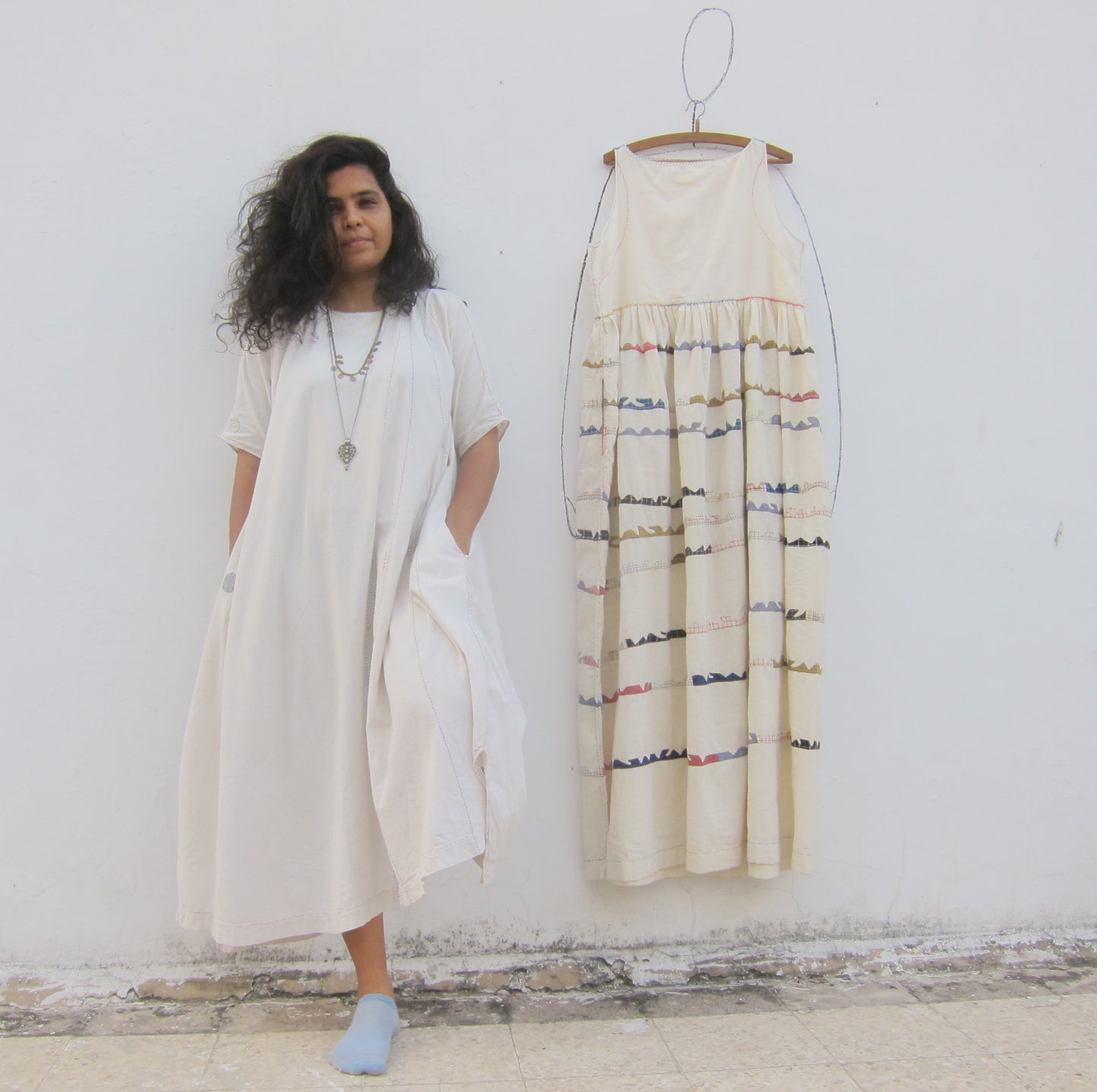Pre-recorded Show & Tell, Asia - Recording
To watch the recording on a larger screen, click on the expand icon ![]() on the bottom right of the screen.
on the bottom right of the screen.
Hosted by Juhi Pandey Technical Head of Nila House Jaipur, this Show & Tell will travel through the textiles and crafts of Asia. Each of the artisans listed below will talk about one of their textiles pieces they have brought along. Juhi will lead the discussions, asking questions and creating conversations about textiles in the Asia.
India
Kalam Jhala, RaasLeela
Kalam Jhala is a Project Manager at RaasLeela Textiles. RasLeela describes itself as a sustainable clothing and accessories brand that places great importance on reducing textile waste. Made from fabric debris generated by other local design houses and repurposed as embellishment on the off-white base fabric, the only kind of fabric that the brand uses.
Reusing waste fabric is RaasLeela founder Hetal Shrivastav's attempt at being part of the solution to the problems of textile waste and the amount of fabric that finds its way into landfills. One designer's waste is another's resource. It also works to fulfil a bran ideal. Working with waste means that no two pieces, even in the same style, can be identical, which adds to the uniqueness of a RaasLeela product. Also, most of the clothing is produced in free sized and small batches. If a product sells out it's made again only on order.
Sneha Chaudhary, 7Weaves
The indigenous communities from the forests of Assam, in the Indo-Burma ecological region, have a long tradition of spinning and weaving silk, with every woman taking pride in their skills and final products. Mandakini, 7WEAVES founder journey began with a quest to support the women from these communities, empowering them and allowing them to secure economic freedom, while also protecting the forests where they lived.
Through a process of continuous questioning, learning and awakening, 7Weaves was born, taking a radically different approach in conservation of biodiversity, "If we want to safeguard the forests, we need to respect and learn from those that have always lived in the forest." 7Weaves seeks to leverage the knowledge and skills of the community for every process of fabrication, from rearing the silkworms sustainably to weaving high-quality fabrics.
Abdulrahim Khatri
Ajrakh is a unique form of block-printing found in Sind Pakistan neighbouring areas of India in the states of Rajasthan and Gujarat. Interestingly the colour is not actually printed directly on the fabric with the wooden blocks, but rather a complex 16 stage process involving mordants and resists.
Akhtar Mir, AFRA by House of Mirs
Akhtar Mir is a pashmina hand embroidery artisan from Kashmir (India), and belongs to AFRA (House Of Mirs) family. This family has been involved with the Kashmir shawl industry since 1885.
Laos
Veomanee Douangdala, Ock Pop Tok
Founded in 2000 by Joanna Smith and Veomanee Douangdala, Ock Pop Tok is an artisan social enterprise based in Luang Prabang, Laos. Over the years we have grown from a small shop selling only a few designs, to becoming one of the most important textile and artisanal institutions in all of Laos and South East Asia. Ock Pop Tok is now a team of over 78 employees.
Ock Pop Tok (meaning “East Meets West” in Lao) was founded on the principles of fair trade and sustainable business practices and the original concept was to bring people together through textiles to exchange knowledge and ideas. The company was pioneering social business and ethical fashion before these terms were even a part of our cultural lexicon.
Bhutan
Kelzang Wagmo, Kelzang Handicraft
Kelzang handicraft was one of the first handicraft shops in Thimphu, Bhutan. Kelzang Wangmo, also known as Jambay, who runs the shop, is from Khoma village in Lhuntse, famed for exquisite 'Kishutharas', traditional wrap dresses for women made from intricately woven rectangular cloth which take about 7-8 months to finish. Wangmo was only ten when she started weaving in her village, Khoma, in eastern Bhutan, which is renowned for exquisite weaving.
At 16 she moved to Thimphu with her family and started weaving kiras and ghos (the garments of Bhutan’s national dress) with her sisters. In 1995 she opened the small retail shop as an outlet to sell her designs, which nowadays range from kiras to table runners, placemats, scarves and stoles. Currently, she employs around 60-70 women weavers in Thimphu and in Lhuntse, allowing them to be able to provide for their family and gain independence. The weavers, always female, are esteemed as artists for their highly skilled and visually stunning mastery of colour, pattern and composition.
Malaysia
Edric Ong Liang Bin, AHPADA (Asean Handicraft Promotion and Development Association)
AHPADA is a non-governmental organisation which acts as a regional forum for Southeast Asian member states to address issues concerning the revitalisation, promotion and development of crafts. It works with international agencies and non-governmental organisations to create an awareness of Southeast Asian craft products. Its activities include the organisation of seminars, craft workshops and exhibitions and participation in trade and craft fairs and showcases.
Thailand
Lee Chinalai representing Somporn Intaraprayong
Somporn is a self-taught artist, whose embroidered textiles are now coveted by collectors around the world. An influential moment in her professional development was meeting Vichai Chinalai, Lee’s husband, of Chinalai Tribal Antiques, whilst working selling jewellery in Bangkok. With an instinctive trust and shared passion for Thai handicraft, the pair began sharing sources and collecting unique and rare textiles. Together they have exhibited eight times at the Sante Fe Folk Art Marker and have gained an enthusiastic following, including trend forecaster Li Edelkoort who featured Somporn’s work in last year’s New York Textile Month publication.
Share






























